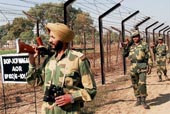 |
| A BSF jawan at the Wagah border in Amritsar on Friday. (PTI) |
New Delhi, Dec. 28: The Indian security establishment was closely monitoring the situation in Pakistan in the wake of Benazir Bhutto’s assassination, assessing the immediate impact it could have on this country.
The cabinet committee on security met this evening to take stock of events rather than to take decisions on new measures.
National security adviser M.K. Narayanan was understood to have briefed the committee chaired by Prime Minister Manmohan Singh.
The briefing covered the internal situation in India — touching upon the violence in Orissa where churches were attacked earlier this week — and an overview of troubles in the South Asian region.
On Pakistan, the security establishment wants to wait and watch the turn of events surrounding the scheduled January 8 elections. Pakistan’s army was also stretched and the turmoil was likely to make increased demands on it.
The suspension of the Samjhauta Express service was a preventive measure to deny militants a “high-value target” that was of great symbolic importance to both India and Pakistan.
Inputs available with the army here do not suggest that there is reason to fear movement of militants from Pakistan towards India across the Kashmir border in the short term.
A high-level source said an alert sounded across the western and southern borders last night was “routine” and did not demand measures such as reinforcing the forces already there.
In one assessment, it was noted that the Pakistani army had deployed an additional 15 brigades — about 45,000 troops — in the Swat valley, Baluchistan, Southern and Northern Waziristan and Bajaur Agency (of the federally administered tribal areas).
Some of these brigades were from the Army Reserve North and the Army Reserve South, the Pakistan army’s two strike corps.
Although there has been no “denuding” of forces from Pakistan’s east (its border with India) to the west (towards Afghanistan), the Pakistani army was considerably stretched at this time. The deployments have taken place over six months, it was assessed.
The pressure on the army would make it difficult for it to accommodate militants in Pakistan occupied Kashmir, who may be looking to cross over to India through the Line of Control.
Moreover, most high passes in Kashmir are inaccessible because of heavy snowfall this winter.
“The only way these elements can enter India now is through other countries,” a source said. This was the reason India does not expect a “blowback” of militancy in Pakistan in the short term.










